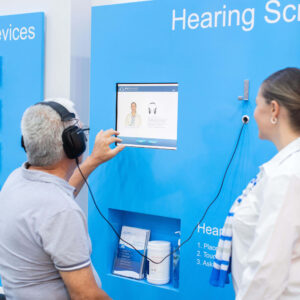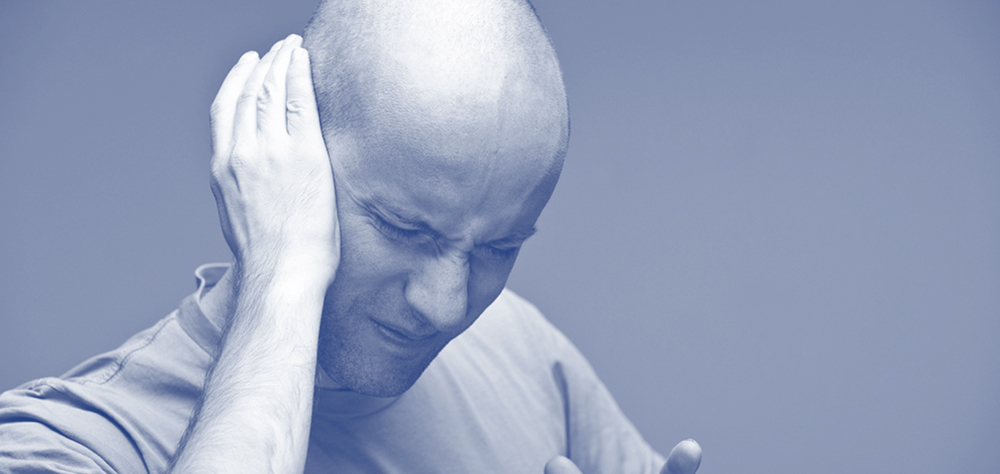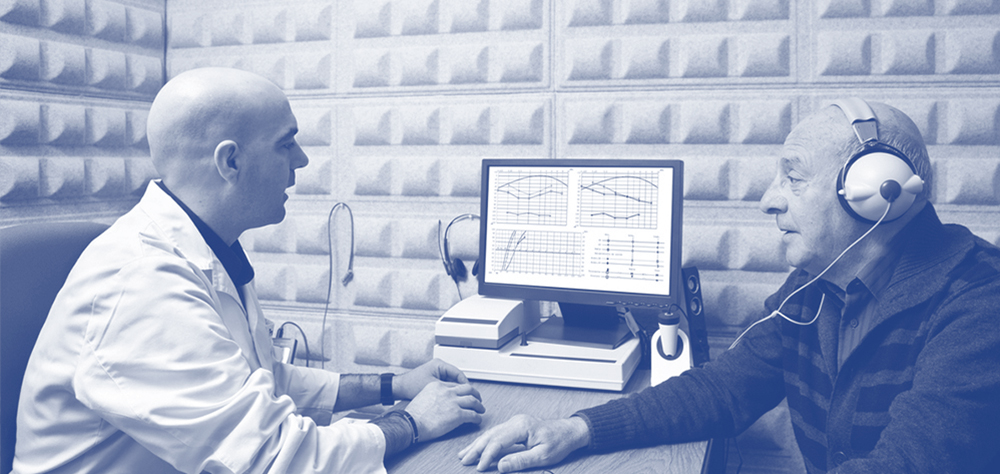Adult hearing loss can be a symptom stemming from a number of medical conditions. There are hundreds of conditions from mild to chronically severe where sudden hearing loss may occur.
One in three adults between 65 and 74 experience some hearing loss symptoms, whilst one in two over 75 years of age are affected. In this article, we’ll look at some of the most common conditions that can cause hearing loss.
Presbycusis
What is presbycusis?
Presbycusis is the medical term for hearing loss caused by the natural process of ageing. It’s caused by the delicate structures inside the ear breaking down over time. Just as our knees can lose their functionality as we get older, the inner workings of our ears can also stop working as they used to.
This is the most common type of hearing loss in adults, and it usually happens gradually.
Presbycusis symptoms
The signs that you might have age-related hearing loss include:
- Difficulty hearing high pitched sounds
- Hearing other people’s speech as slurred or mumbled
- The inability to distinguish speech from background noise
- Difficulty hearing people speak even when they raise their voice
- Difficulty hearing speech on the phone
- Certain sounds seem annoying or overly loud
- Ringing in the ears
What should I do?
If you are experiencing any of these symptoms, the best thing to do is visit your doctor for a diagnosis. It’s important to rule out any other medical conditions first.
Unfortunately, presbycusis cannot be cured or reversed. On the positive side, however, modern hearing aids can help – get in touch with a Bay Audio clinician for more information.
Acoustic trauma
What is acoustic trauma?
The second most common type of sudden hearing loss in adults is trauma to the inner ear caused by exposure to excessively loud noise. Because the structures inside your ear are quite sensitive, they are susceptible to damage.
Sounds such as gunshots or gunshots can permanently harm your hearing, as can sustained exposure to loud noises (such as heavy machinery or amplified music).
Acoustic trauma symptoms
The hearing loss symptoms of acoustic trauma can include:
- Tinnitus (i.e. a ringing in the ear)
- Inability to hear high pitched sounds
- Bleeding from the ear
- Redness, bruising or swelling
- Earache
- The feeling of having an object in your ear
- Mild to severe hearing loss
What should I do?
A hearing loss caused by trauma tends to get worse over time. The first step to getting treatment is to see a doctor, who will be able to run diagnostic tests to determine which parts of your ear have been damaged.
Depending on the nature of your injury, your doctor might be able to prescribe steroids to reduce inflammation and preserve your hearing. Another form of medical treatment is hyperbaric oxygen therapy (HBOT), which can reduce swelling and minimise cochlear damage.
If your eardrum has been perforated from acoustic trauma, you might be eligible for eardrum repair surgery, which is performed by an ear, nose and throat (ENT) specialist.
For those with permanent hearing loss, hearing aids (or other types of listening devices) might be suitable.
Ototoxicity
What is ototoxicity?
Medications classified as ototoxic can cause damage to the inner ear as a side effect. Ototoxicity is what happens when a medication damages the sensory cells that help with balance and hearing. Ototoxic medications include chemotherapy drugs, certain antibiotics and non-steroid anti-inflammatories.
Because these types of medications are usually prescribed to older people, ototoxicity is a common cause of adult hearing loss.
Ototoxicity symptoms
If you’ve been prescribed an ototoxic drug to treat a serious illness, your medical team will advise you of the effect it might have on your hearing, and ask you to monitor your symptoms.
These are some of the things to look out for if you’re taking ototoxic medication:
- Tinnitus (ringing in the ears)
- Difficulty understanding speech
- Balance problems and dizziness
Ototoxicity treatment
Sometimes, the hearing problems caused by ototoxic drugs will reverse when you stop taking the medication. However, in some cases the damage is permanent.
There is currently no protective strategy for the hearing damage that ototoxic drugs can cause, although research is being done to find ways to protect people.
Enlarged vestibular aqueduct
What is an enlarged vestibular aqueduct?
Vestibular aqueducts are the narrow bony canals that travel from the inner ear to inside the skull. If the vestibular aqueducts become enlarged for any reason, it can cause hearing damage.
Enlargement of the vestibular aqueduct can be caused by a number of things; the most well-known of which is a mutation in the SLC26A4 gene. Environmental factors can also cause the vestibular aqueducts to become enlarged.
Symptoms of an enlarged vestibular aqueduct
This condition usually affects younger people, and can cause symptoms such as:
- Mild to severe hearing loss (which can fluctuate)
- Vertigo (the sensation of spinning)
- Balance problems and dizziness
Enlarged vestibular aqueduct treatment
Unfortunately, it’s difficult to treat this condition. If you’re experiencing symptoms of an enlarged vestibular aqueduct, it’s important to seek medical attention as soon as possible, because early detection can help to reduce its impact on your hearing.
If you have this condition, you will need to be especially mindful to avoid any kind of physical impact to the head. You should also avoid situations where you’re exposed to rapid changes in air pressure, such as scuba diving.
Ménière’s disease
What is Ménière’s disease?
Thought to be caused by a buildup of fluid inside compartments of the inner ear, Ménière’s disease can cause hearing damage and balance problems. Fluid imbalances in this part of the ear can prevent hearing signals from reaching the brain.
No definite answers are available about what causes Ménière’s disease, although it appears to run in families and could therefore be genetic. This condition most commonly affects adults who are between 40 and 60 years of age.
Ménière’s disease symptoms
The most common symptoms of Ménière’s disease include:
- Vertigo (the sensation of spinning)
- Nausea
- Tinnitus (ringing in the ears)
- Hearing loss (usually temporary)
- A feeling of fullness in the ear
Ménière’s disease treatment
The symptoms of Ménière’s disease can be treated (although there’s no cure as such). Here are some treatment options that can be medically prescribed to people who are suffering from this condition:
- Medication to relieve dizziness and improve balance
- Following a diet that’s low in salt
- Reducing smoking, drinking and caffeine intake
- Surgery (in cases where other treatments have failed)
Meningitis
What is meningitis?
Meningitis is a condition that occurs when the membranes of the brain and spinal cord become infected and swell up. This is a very serious condition that can cause death.
It can be caused by bacteria and viruses; immunisation can protect against some forms of this disease. Meningitis can also be caused by some prescribed medications.
Meningitis symptoms
If you think you might have meningitis, seek medical treatment immediately. Symptoms can include:
- Severe headache
- Fever
- Neck stiffness
- Vomiting
- Confusion and drowsiness
- Skin rash or bruising
- Sensitivity to bright lights and loud noises
- Hearing loss
Meningitis treatment
It’s essential that you see a doctor as soon as possible if you have symptoms of meningitis. They will be able to determine whether the meningitis is bacterial or viral, and help you get the treatment you need.
You might be prescribed steroids to help reduce the risk of brain damage, and also possibly reduce the possibility of having permanent hearing damage and blindness.
If your hearing has been affected from meningitis, hearing aids can help with hearing loss and tinnitus.
Acoustic neuroma
What is acoustic neuroma?
‘Acoustic neuroma’ is the medical term for a non-cancerous growth that grows in the canal that connects the inner ear to the brain. These benign tumours affect about 1 in 100,000 people, and they usually only affect one ear.
If left untreated, an acoustic neuroma can affect important hearing nerves (as well as facial and balance nerves), and could eventually reach the brain. The causes of this condition are unknown, and it’s often mistaken for other, more harmless disorders.
Acoustic neuroma symptoms
The main symptoms of acoustic neuroma include:
- Hearing loss in one ear
- Headache
- Tinnitus (ringing in the ears)
- Difficulty balancing
- Facial numbness and/or pain (in some cases)
- Facial twitches
- A feeling of fullness in one ear
- Visual disturbances
- Difficulty swallowing
Acoustic neuroma treatment
Early detection improves your chances of making a full recovery, so it’s important to seek medical treatment as soon as possible. An ear, nose and throat specialist (ENT) might be able to surgically remove the tumour, or a non-invasion stereotactic procedure using gamma radiation might be recommended instead.
Otosclerosis (overgrown bone)
What is otosclerosis
Otosclerosis is a bone abnormality in the middle ear that can cause hearing damage. This abnormal bone growth can prevent the inner workings of your ear from working properly, thus causing hearing loss.
It’s not known what causes otosclerosis, but there’s possibly a generic cause, as it tends to run in families.
Otosclerosis symptoms
While otosclerosis tends to first appear in only one ear, in the majority of cases the condition will spread to both ears. Symptoms include:
- Hearing loss that gets gradually worse over time
- Vertigo and dizziness
- Tinnitus (ringing in the ears)
Otosclerosis treatment
If you think you might have otosclerosis, visit your GP. They’ll be able to refer you to an ear, nose and throat specialist or an audiologist. In certain cases, a CT scan might be needed to reach a diagnosis.
Treatment options include a surgical procedure known as a stapedectomy, or hearing aids.
Cholesteatoma (skin cysts)
What is cholesteatoma?
A cholesteatoma is a skin cyst located in the mastoid bone in the skull and the inner ear that can cause hearing loss. The most common cause of cholesteatoma is a chronic ear infection, but it can also be the result of a birth defect.
Cholesteatoma symptoms
These are the main symptoms of cholesteatoma:
- Hearing loss in one ear
- Dizziness
- Drainage from one ear
- A sensation of fullness in one ear
Cholesteatoma treatment
Your doctor will be able to perform an ear exam to see if your eardrum is perforated, or recommend a series of diagnostic tests (possibly including a CT scan).
If not removed, cholesteatomas can continue to grow and cause damage. You can have surgery to remove a cholesteatoma, but there’s a possibility that it might come back. You might also need to have your ear regularly cleaned by a hearing health professional.
Make an audiology appointment today

If you’ve experienced a sudden hearing loss, Bay Audio can help you find hearing solutions. We specialise in adult hearing loss, and our expert team of audiologists is available to answer any questions you might have.
Chat to a clinician today to look after your hearing health and improve your quality of life.
Resources:
- http://www.webmd.com/hearing-loss-causes-symptoms-treatment
- http://www.cochlear.com/hearing-and-hl/medical-conditions/medical-conditions-in-adults
- https://betterhealthwhileaging.net/hearing-loss-in-aging/
- https://www.cochlear.com/au/en/home/diagnosis-and-treatment/diagnosing-hearing-loss/types-and-causes-of-hearing-loss
- https://www.betterhealth.vic.gov.au/health/conditionsandtreatments/deafness-a-range-of-causes
- https://www.racgp.org.au/afp/2013/september/sudden-onset-hearing-loss




